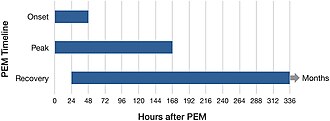Fatigue: Difference between revisions
From WikiMD's Wellness Encyclopedia
No edit summary |
CSV import Tags: mobile edit mobile web edit |
||
| Line 1: | Line 1: | ||
Fatigue | == Fatigue == | ||
[[File:Timeframe_of_PEM_from_daily_activities.jpg|thumb|right|Diagram illustrating the timeframe of post-exertional malaise from daily activities.]] | |||
Fatigue is | '''Fatigue''' is a common symptom experienced by individuals across various conditions and is characterized by a persistent feeling of tiredness or exhaustion. It can be both a physical and mental state, affecting a person's ability to perform daily activities effectively. | ||
== Causes of Fatigue == | |||
Fatigue can result from numerous factors, including: | |||
* [[Sleep disorders]] such as [[insomnia]] or [[sleep apnea]]. | |||
* [[Chronic illnesses]] like [[chronic fatigue syndrome]] (CFS), [[fibromyalgia]], and [[multiple sclerosis]]. | |||
* [[Mental health]] issues, including [[depression]] and [[anxiety]]. | |||
* [[Lifestyle factors]] such as poor diet, lack of exercise, and excessive stress. | |||
* [[Medications]] that have fatigue as a side effect. | |||
== Symptoms == | |||
The primary symptom of fatigue is a persistent feeling of tiredness that does not improve with rest. Other symptoms may include: | |||
* [[ | * Difficulty concentrating or [[cognitive impairment]]. | ||
* [[ | * [[Muscle weakness]] or soreness. | ||
* [[ | * [[Headaches]]. | ||
* [[Dizziness]] or lightheadedness. | |||
* Irritability or mood changes. | |||
* [[ | |||
* | |||
== | == Diagnosis == | ||
Diagnosing fatigue involves a comprehensive evaluation to determine the underlying cause. This may include: | |||
* A detailed medical history and physical examination. | |||
* [[Blood tests]] to check for [[anemia]], [[thyroid function]], and other potential causes. | |||
* [[Sleep studies]] to identify sleep disorders. | |||
* [[Psychological assessments]] to evaluate mental health conditions. | |||
== Management == | |||
Managing fatigue typically involves addressing the underlying cause. General strategies include: | |||
* | * Improving [[sleep hygiene]] and ensuring adequate rest. | ||
* | * Engaging in regular [[physical activity]] tailored to the individual's capabilities. | ||
* | * Managing stress through [[relaxation techniques]] and [[counseling]]. | ||
* Adjusting medications if they contribute to fatigue. | |||
* Nutritional support and [[dietary changes]]. | |||
== | == Related Pages == | ||
* [[Chronic fatigue syndrome]] | |||
* [[Sleep disorders]] | |||
* [[Depression]] | |||
* | * [[Fibromyalgia]] | ||
* | |||
* | |||
{{Medical symptoms}} | |||
[[Category:Symptoms]] | [[Category:Symptoms]] | ||
Revision as of 16:30, 16 February 2025
Fatigue

Fatigue is a common symptom experienced by individuals across various conditions and is characterized by a persistent feeling of tiredness or exhaustion. It can be both a physical and mental state, affecting a person's ability to perform daily activities effectively.
Causes of Fatigue
Fatigue can result from numerous factors, including:
- Sleep disorders such as insomnia or sleep apnea.
- Chronic illnesses like chronic fatigue syndrome (CFS), fibromyalgia, and multiple sclerosis.
- Mental health issues, including depression and anxiety.
- Lifestyle factors such as poor diet, lack of exercise, and excessive stress.
- Medications that have fatigue as a side effect.
Symptoms
The primary symptom of fatigue is a persistent feeling of tiredness that does not improve with rest. Other symptoms may include:
- Difficulty concentrating or cognitive impairment.
- Muscle weakness or soreness.
- Headaches.
- Dizziness or lightheadedness.
- Irritability or mood changes.
Diagnosis
Diagnosing fatigue involves a comprehensive evaluation to determine the underlying cause. This may include:
- A detailed medical history and physical examination.
- Blood tests to check for anemia, thyroid function, and other potential causes.
- Sleep studies to identify sleep disorders.
- Psychological assessments to evaluate mental health conditions.
Management
Managing fatigue typically involves addressing the underlying cause. General strategies include:
- Improving sleep hygiene and ensuring adequate rest.
- Engaging in regular physical activity tailored to the individual's capabilities.
- Managing stress through relaxation techniques and counseling.
- Adjusting medications if they contribute to fatigue.
- Nutritional support and dietary changes.